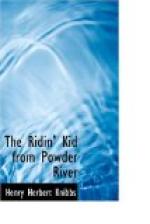Pete, satisfied that he had conducted himself in a manner befitting the occasion, backed away a few steps and finally turned and marched across the mesa. They had wrecked his outfit. He’d show ’em! Old Montoya knew that something was wrong when the burros drifted in with their pack-saddles askew. He thought that possibly some coyote had stampeded them. He righted the pack-saddles and drove the burros back toward Laguna. Halfway across the mesa he met Pete, who told him what had happened. Montoya said nothing. Pete had hoped that his master would rave and threaten all sorts of vengeance. But the old man simply nodded, and plodding along back of the burros, finally entered Laguna and strode up to the store. All sorts of stories were afloat, stories which Montoya discounted liberally, because he knew Pete. The owner of the dog claimed damages. Montoya, smiling inwardly, referred that gentleman to Pete, who stood close to his employer, hoping that he would start a real row, but pretty certain that he would not. That was Montoya’s way. The scattered provisions as far as possible were salvaged and fresh supplies loaded on the burros. When Montoya was ready to leave he turned to the few Mexicans in front of the store: “When I send my boy in here for flour and the beans and the sugar, it will be well to keep the dogs away—and to remember that it is Jose de la Crux that has sent him. For the new provisions I do not pay. Adios, senors.”
Pete thought that this was rather tame—but still Montoya’s manner was decidedly business-like. No one controverted him—not even the storekeeper, who was the loser.
A small crowd had assembled. Excitement such as this was rare in Laguna. While still in plain sight of the group about the store, and as Montoya plodded slowly along behind the burros, Pete turned and launched his parthian shot—that eloquently expressive gesture of contempt and scorn wherein is employed the thumb, the nose, and the outspread fingers of one hand. He was still very much a boy.
About a year later—after drifting across a big territory of grazing land, winter-feeding the sheep near Largo, and while preparing to drive south again and into the high country—Pete met young Andy White, a clean-cut, sprightly cowboy riding for the Concho outfit. Andy had ridden down to Largo on some errand or other and had tied his pony in front of the store when Montoya’s sheep billowed down the street and frightened the pony. Young Pete, hazing the burros, saw the pony pull back and break the reins, whirl and dash out into the open and circle the mesa with head and tail up. It was a young horse, not actually wild, but decidedly frisky. Pete had not been on a horse for many months. The beautiful pony, stamping and snorting in the morning sun, thrilled Pete clear to his toes. To ride—anywhere—what a contrast to plodding along with the burros! To feel a horse between his knees again! To




